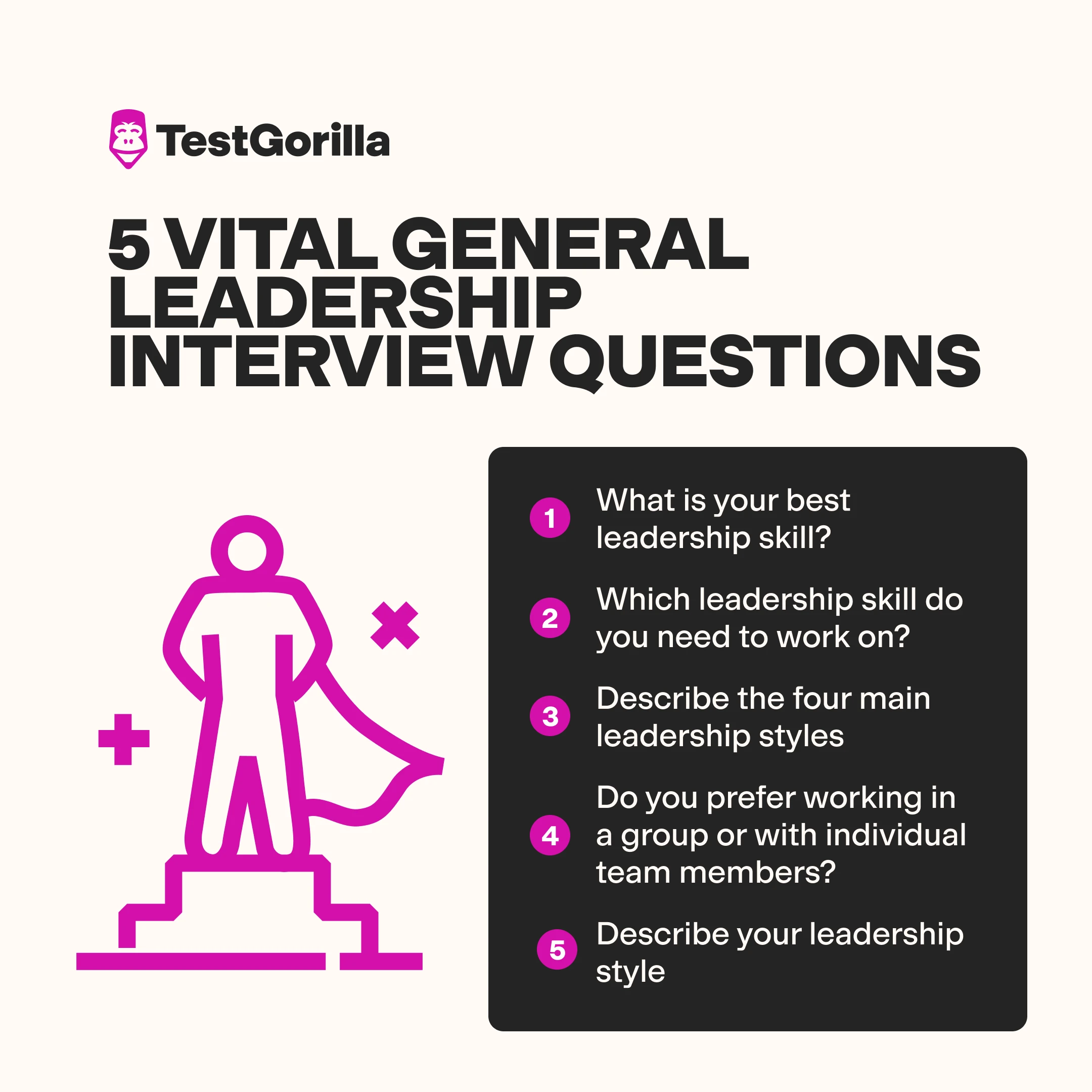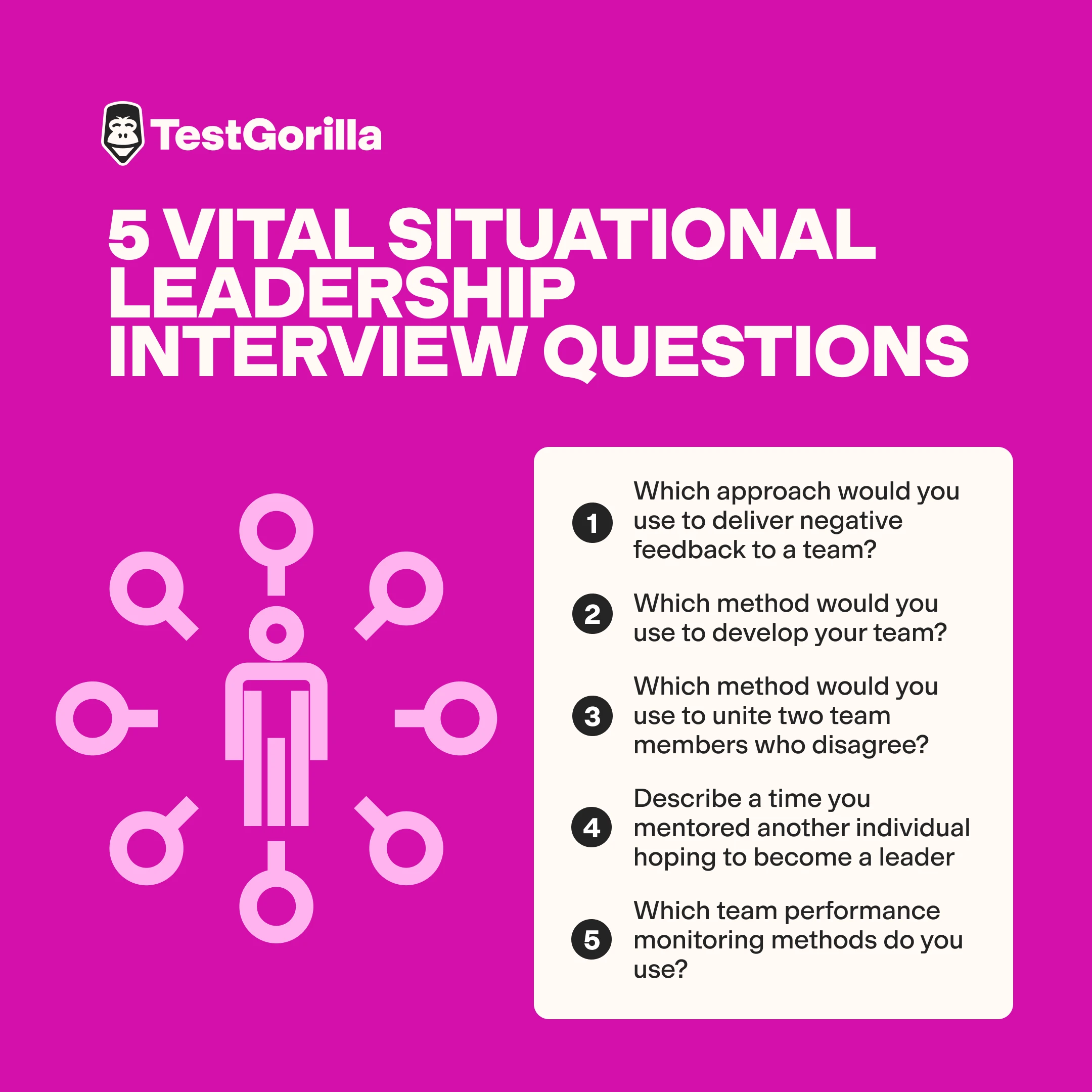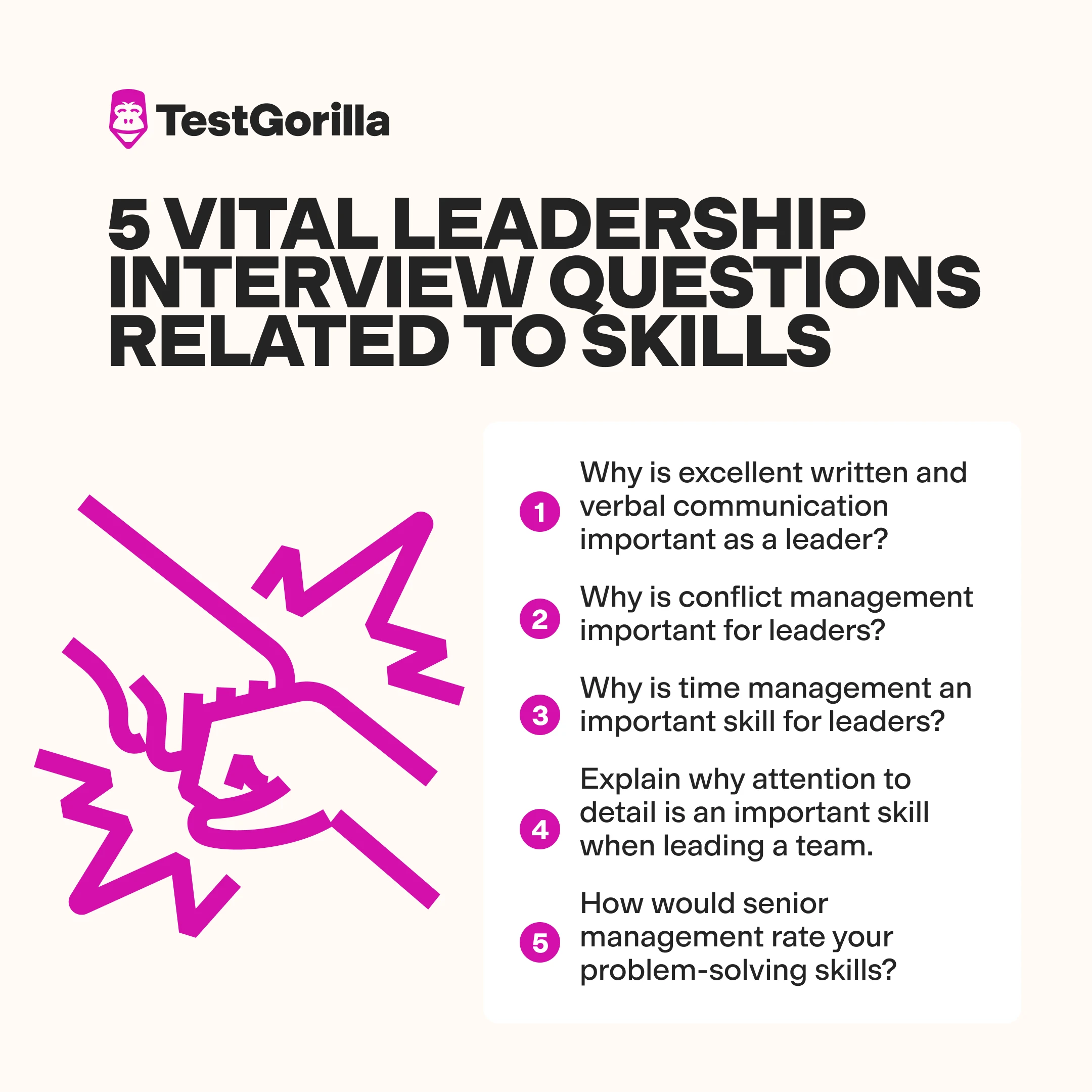When screening potential candidates for your team, selecting an applicant who fits your company and has the right skills is crucial. It’s particularly important when searching for a leader who can enhance employee engagement, drive productivity, and improve your team’s cohesion.
The key to discovering the right leader is all about asking the right leadership interview questions. But which questions are ideal?
If you haven’t found the perfect set of questions, don’t panic. In this article, we’ve assembled 53 of the best leadership interview questions ready for you to fire off.
You’ll also find a selection of skills tests in this article, such as our Leadership & People Management test, to make the process of finding a capable leader simple, stress-free, and almost effortless.
Interested? Then continue reading to access our ultimate list.
Table of contents
- 15 general leadership interview questions to ask potential leaders
- 5 vital general leadership interview questions and answers
- 27 situational leadership interview questions
- 5 vital situational leadership interview questions and answers
- 11 leadership interview questions related to leadership skills
- 5 vital leadership interview questions and answers related to skills
- For what roles can you use leadership interview questions?
- When in your hiring process should you use leadership interview questions?
- Find a capable leader using leadership interview questions and TestGorilla
15 general leadership interview questions to ask potential leaders
Ask potential leaders these 15 general leadership interview questions to learn about their leadership experience, knowledge, and style.
Which values are important to you as a leader?
How do you ensure your team is committed to their projects?
What is your best leadership skill?
Which leadership skill do you need to work on?
Do you prefer working in a group or with individual team members?
How frequently do you meet with your team?
What makes leadership difficult?
Which factors motivate you as a leader?
Describe your leadership experience so far.
What do you hope to achieve as a leader for our organization?
Describe your leadership style.
Describe the four main leadership styles.
Name a business leader who inspires you.
Explain why we should hire you to become our next leader.
Would you make any changes to our organization if hired?
5 vital general leadership interview questions and answers
Check the answers to these five general leadership interview questions, and use them as a guide to review your candidates’ answers after the interview.
1. What is your best leadership skill?
Candidates may have several leadership skills that simplify team and project management. For example, they may mention that negotiation and delegation are their best leadership skills or that mentoring and coaching make their work easier.
Or they may tell you their top leadership skill is empathy, which research has shown to be one of the most important leadership abilities.
Check how your candidates’ best leadership skills have helped them complete challenging team management tasks by asking follow-up questions, such as “How did this skill help you motivate your team?” Alternatively, you may use our Leadership & People Management or Negotiation skills tests before the interview to assess them.
2. Which leadership skill do you need to work on?
Leadership can be challenging, which may be why only 10% of people are natural leaders. Your candidates may not have perfected every leadership subskill required to manage projects efficiently, but they should be committed to developing the leadership subskills they lack.
Say a candidate lacks time-management skills. In that case, they may complete courses or read time-management books to hone their time-management abilities.
Evaluate their time-management abilities with a Time Management skills test, and always consider whether they can describe the methods they use to improve their skills.
3. Describe the four main leadership styles
Candidates with the right leadership knowledge should have a solid understanding of the four main leadership styles. They may mention the following examples when responding to this interview question:
Delegation: Leaders who use a delegation leadership style entrust several responsibilities to each team member by aligning the tasks to their experience and strengths.
Supportive: A supportive leadership style involves being open-minded, encouraging collaborative teamwork, and listening to the team’s ideas.
Direct: A direct leadership style involves providing explicit instructions to a team to reduce the need to provide excessive support. This leadership style is ideal when outsourcing projects to contractors.
Coaching or mentorship: Leaders who use a coaching leadership style emphasize and explain the company’s vision to their team and motivate each team member to achieve their goals.
4. Do you prefer working in a group or with individual team members?
Whether they prefer working in a group or with individual team members, most leaders should be capable of handling both situations.
For instance, applicants may mention that they have coached individual team members in one-on-one meetings or lead team meetings frequently. Make sure you ask for specific examples that show their skills and abilities in this area.
If they have just ascended to a leadership role and don’t have much experience with group meetings, check whether they are developing these skills and consider their methods.
5. Describe your leadership style
Since the most appropriate leadership style depends on the organization in which the leader works and the unique circumstances in each specific role, candidates should be willing to be flexible and change their style as needed according to the demands of the position.
To show their flexibility, they may explain that they prefer a coaching leadership style for progression and career advancement meetings and a direct leadership style when working with freelancers. A top candidate will provide detailed examples to show how their leadership style has benefited their teams.
27 situational leadership interview questions
Learn how your candidates handle complex situations by asking them these 27 situational leadership interview questions during the interview.
Describe a time you mentored another individual hoping to become a leader.
Describe a time you had to lead a team while implementing project changes.
Which approach would you use to deliver positive feedback to a team member?
Which approach would you use to deliver negative feedback to a team?
Which method would you use to unite two team members who disagree?
Your team feels demotivated after a project fails. How would you motivate them?
Have you ever been unsure how to help a team achieve its goals?
Describe a situation when you had to make a difficult decision.
Have you ever had to reorganize your team? Which approach did you use?
Have you ever had to work with cross-functional teams?
Which task delegation methods make it easier to distribute responsibilities?
Tell me about a time you had to change your decision because of new information.
Describe a time you had to encourage employee development in your team.
Tell me about a time you had to develop innovative methods to solve a problem.
Which method would you use to develop your team?
How do you ensure your team members deliver the best work within a budget?
Have you ever had to motivate team members who underperformed?
Which team performance monitoring methods do you use?
Describe a time you had to be open-minded when receiving a team member’s ideas.
Tell me about a time you had to evaluate a new team member’s skills.
Describe a time you contributed to a positive work culture.
Have you ever had to make an unpopular decision?
Describe a time you led a highly successful team.
How do you respond if you frequently receive the same negative feedback?
Do you encourage competition within your team? Why or why not?
How would you lead by example in your team?
How would you manage a short-staffed team?
5 vital situational leadership interview questions and answers
Consider the answers to these five situational leadership interview questions when reviewing your potential leaders’ responses following the interview.
1. Which approach would you use to deliver negative feedback to a team?
Since feedback helps a team develop their collective skills, leaders should have the ability to offer negative feedback when required and be able to explain how they would go about this.
There are many ways to deliver negative feedback, from video meetings and email to communication apps. Do your candidates know that each situation may call for a different method of offering feedback and why this is important?
For instance, a quick question about a team’s progress on ongoing projects may only require a short message via a communication app, whereas offering career progression feedback may require a video meeting.
2. Which method would you use to develop your team?
According to a survey conducted by Deloitte and Fortune magazine, 73% of companies are concerned about skills gaps, and many use several methods to develop their teams.
An applicant interested in becoming a leader for your business may explain that remaining committed to their team’s development and actively motivating them through mentoring is a practical, effective approach to developing them.
Candidates may also touch on feedback when responding to this interview question and explain that providing a team with regular constructive feedback is ideal for encouraging team development.
3. Which method would you use to unite two team members who disagree?
Although there are many situations in which team members may disagree, leaders should always be able to unite them with a constructive, practical discussion.
Can your candidates explain how they find common ground between two team members who disagree? Do they have experience acting as mediators and coming to an agreement that works for both team members? Remember to ask for specific examples.
4. Describe a time you mentored another individual hoping to become a leader
When mentoring potential leaders, good leaders should do the following:
Use active listening to understand the team member’s goals
Share personal experiences
Provide feedback
Monitor the individual’s progress and offer support when needed
Applicants should be able to show that they can encourage aspiring leaders when taking these actions, even when achieving targets may seem challenging.
5. Which team performance monitoring methods do you use?
From using monitoring software to checking in frequently with team members and setting targets, there are many methods to handle team performance monitoring as a leader. Can your applicants explain how their performance monitoring approach has streamlined career progression and made offering feedback to team members easier?
11 leadership interview questions related to leadership skills
Find out whether your candidates understand which skills are important for leaders by asking them these leadership interview questions related to leadership abilities.
Why is excellent written and verbal communication important as a leader?
How would your team members rate your leadership skills?
How would senior management rate your critical-thinking skills?
Why is time management an important skill for leaders?
Explain why negotiation is an important skill for leaders.
How would senior management rate your problem-solving skills?
Why is conflict management important for leaders?
How would your team rate your employee motivation skills?
How would you rate your task-delegation skills?
Explain why attention to detail is an important skill when leading a team.
How would senior management rate your presentation skills?
5 vital leadership interview questions and answers related to skills
Check the following answers to our skill-related leadership interview questions to assess your applicants’ responses after the interview.
1. Why is excellent written and verbal communication important as a leader?
When providing written feedback or preparing progress reports, a leader should use high-quality written communication to ensure that teams interpret feedback and guidance properly.
Since employees spend 23% of their time engaged in business communication on in-person interactions, leaders also need excellent verbal communication skills.
Our Communication skills test will help you review your applicant’s written and verbal communication abilities and active listening skills.
2. Why is conflict management important for leaders?
Managers spend an average of more than four hours per week dealing with conflict.
Not every team will be fully cohesive, and team members may disagree when working on particular projects. For instance, a software developer may take issue with project-related feedback from a maintainer or team lead. In that case, leaders should be able to step in and use their conflict-management skills to resolve disagreements.
Ask applicants this leadership interview question to ensure that they understand the importance of conflict-management skills and can resolve disagreements effectively.
3. Why is time management an important skill for leaders?
Experienced candidates should understand that splitting their time efficiently between their team members and their own tasks is a fundamental part of management. Achieving the correct balance here often lies in one’s time-management abilities.
Whether they are arranging team meetings to suit an entire team’s schedule or setting time aside to meet with senior management, leaders should be able to prioritize and not lose track of time.
Assessing your candidate’s time-management skills is simple with our Time Management skills test; look up this test in our test library for more details.
4. Explain why attention to detail is an important skill when leading a team.
Attention to detail can enhance efficiency and optimize time management by ensuring leaders don’t have to readdress issues multiple times. Do your candidates understand why attention to detail is important? Can they explain how attention to detail also enhances the consistency and quality of work team members produce?
If you need a method to review your candidate’s attentiveness, our Attention to Detail test is simple, effective, and available on our free plan.
5. How would senior management rate your problem-solving skills?
Solving problems is an essential part of leadership. Whether they’re solving team disputes or providing answers related to project-related challenges, leaders should have the problem-solving skills to facilitate these tasks.
Some problems may be more challenging than others. The better your leader’s problem-solving skills, the more efficiently they can handle them.
To assess your candidates’ problem-solving skills, use our Problem Solving test.
For what roles can you use leadership interview questions?
The great thing about leadership interview questions is that you can use them for managers, team leaders, and senior management in various fields. Whether you’re hiring a head teacher for a school, a developer team lead, a marketing director, or an accounting manager, these leadership interview questions are ideal.
Remember to ask follow-up questions to dig deeper into your candidates’ experience, and give them a chance to ask you questions at the end of the interview.
When in your hiring process should you use leadership interview questions?
As soon as you’ve asked potential leaders to complete a skills assessment and received their results, you can invite them to an interview and ask them leadership interview questions. Taking this approach enables you to determine which candidates you should remove from the hiring process and formulate relevant questions based on the results.
Find a capable leader using leadership interview questions and TestGorilla
The best approach to finding a competent leader for your organization is to combine TestGorilla’s skills tests and leadership interview questions; it’s a fast, efficient method to assess applicants and create a shortlist.
To start using expert-created, peer-reviewed skills tests like our Leadership & People Management test, visit our skills test library and find out how TestGorilla works for free.
Related posts
Hire the best candidates with TestGorilla
Create pre-employment assessments in minutes to screen candidates, save time, and hire the best talent.
Latest posts
The best advice in pre-employment testing, in your inbox.
No spam. Unsubscribe at any time.

Hire the best. No bias. No stress.
Our screening tests identify the best candidates and make your hiring decisions faster, easier, and bias-free.
Free resources
This checklist covers key features you should look for when choosing a skills testing platform
This resource will help you develop an onboarding checklist for new hires.
How to assess your candidates' attention to detail.
Learn how to get human resources certified through HRCI or SHRM.
Learn how you can improve the level of talent at your company.
Learn how CapitalT reduced hiring bias with online skills assessments.
Learn how to make the resume process more efficient and more effective.
Improve your hiring strategy with these 7 critical recruitment metrics.
Learn how Sukhi decreased time spent reviewing resumes by 83%!
Hire more efficiently with these hacks that 99% of recruiters aren't using.
Make a business case for diversity and inclusion initiatives with this data.




















